Diplomatic Bluebook 2021
Opening Spetial Features
Responses to the Novel Coronavirus Disease (COVID-19)
2 Initiatives of the Government of Japan, including the Ministry of Foreign Affairs
The Government of Japan established the Novel Coronavirus Response Headquarters in January 2020 to respond to the pandemic with concerted efforts. From January onwards, the Government, through cooperation among the relevant ministries and agencies, drastically strengthened border measures, helped Japanese nationals abroad return to Japan, and provided support to the crew and passengers on cruise ships. In March, Prime Minister Abe and President Thomas Bach of the International Olympic Committee (IOC) reached the decision to postpone the Olympic and Paralympic Games Tokyo 2020. In April, Japan declared a state of emergency in response to the rise in COVID-19 cases (the declaration was lifted in May). In order to minimize the socio-economic impacts, the measures under the state of emergency declaration took the form of “requests” to the people. This included refraining from non-essential outings, closing schools, shortening business hours, and suspending the use of recreational facilities. The measures did not include curfews or penalties for violations, unlike the lockdowns in major countries, such as Europe and the U.S.
Also in April, the Government made a Cabinet decision on the “Emergency Economic Measures to Cope with COVID-19.” The measures included domestic economic support for employment protection, business continuity and recovery of economic activities, as well as international cooperation, such as support for developing countries and promotion of development of therapeutics and vaccines. Moreover, in December, the Government made a Cabinet decision on “Comprehensive Economic Measures” that included international cooperation for containing the virus.
The Government took various measures against COVID-19. However, in response to a resurgence of cases since November especially in the Tokyo metropolitan area, the Government re-declared a state of emergency for 11 prefectures, including the Tokyo metropolitan area, in January 2021 (the declaration was lifted for all areas by March). In February, relevant laws were revised to establish penalties for restaurants and other businesses that refuse to follow orders to shorten business hours or close temporarily and infected people who refuse to be hospitalized.
1. Ensuring the Safety of Japanese Nationals Abroad and Preventing the Spread of Infection
Ensuring the safety of Japanese nationals residing or traveling overseas is one of the most important responsibilities of the Ministry of Foreign Affairs (MOFA). In response to COVID-19, MOFA has been disseminating relevant information to the broader public in a timely and appropriate manner through the Overseas Safety Website, e-mails, and other mediums. The information includes the Travel Advice and Warning on Infectious Diseases*1, country-specific infection situation, and restrictions on entry and movement.
- *1 Travel Advice and Warning on Infectious Diseases is issued for countries and regions requiring particular caution when travelling to or staying in the destinations in relation to high-risk infectious diseases, including COVID-19.
Level 1: Exercise caution
Level 2: Avoid non-essential travel
Level 3: Avoid all travel
Level 4: Evacuate and avoid all travel
At the end of January 2020, strict movement restrictions were imposed in China's Hubei Province, including the city of Wuhan. In response, the Government of Japan sent a total of five chartered flights to Wuhan ahead of other countries to help Japanese nationals in the region leave China and realized the early repatriation of all 828 Japanese nationals and their families who wished to return to Japan.
Subsequently, border blockades and suspension of international flights across the world resulted in a succession of Japanese nationals unable to leave the countries they were in. MOFA provided assistance to such Japanese nationals who wished to return to Japan. In Africa, while the number of infections was low compared to other continents, many countries have weak medical systems, posing a risk for rapid transmission. In April, Japanese embassies in African countries provided coordination on boarding support for charter flights arranged by travel agencies, third countries, and other parties so that Japanese nationals who could not leave the continent can return to Japan. As a result, a complex operation was materialized. About 300 Japanese nationals who had been stranded in Africa traveled from 15 countries on 10 routes to gather in Addis Ababa, the capital of Ethiopia, which was the only African country with regular service to Japan at the time. From there, they returned to Japan on regular and chartered flights of Ethiopian Airlines.
In the course of these operations, cooperative relations were established between Japan and other countries and regions that similarly provided repatriation support for their citizens. Poland arranged a government chartered flight to repatriate Polish nationals in Japan, which Japanese nationals in Poland were permitted to board. This allowed approximately 200 Japanese nationals to repatriate. In Peru, a Taiwanese chartered flight that Japanese nationals could board was operated through coordination between the local Taipei Economic and Cultural Office and Embassy of Japan. In addition, approximately 100 Taiwanese nationals in Russia boarded an extra flight operated by a Japanese airline from Russia carrying Japanese nationals. Furthermore, cooperation between Japan and the Republic of Korea (ROK) enabled approximately 70 ROK nationals in West Africa and other parts of the continent to board chartered planes that flew the aforementioned 10 routes within Africa. Meanwhile, Japanese nationals left Kenya on an extra flight arranged by the ROK Government. In this way, countries and regions cooperated reciprocally in various areas of Africa for the repatriation of their nationals.
With such support of Japanese embassies and consulates-general around the world, more than 12,000 Japanese nationals returned to Japan from a total of 101 countries by the end of November.
Diagram of issuance of Warnings on Infectious Diseases
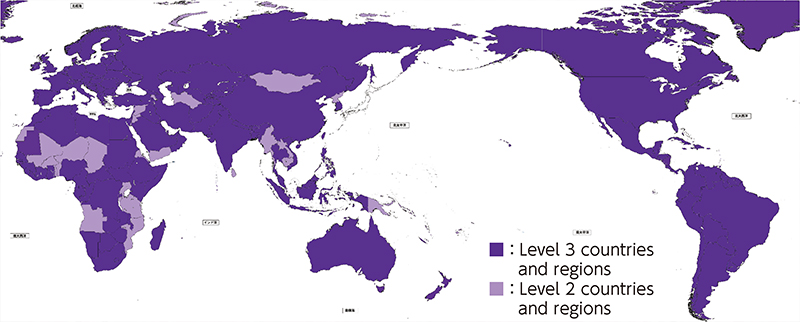 As of August 26 (the most severe situation)
As of August 26 (the most severe situation)Level 3: 159 countries and regions
Level 2: the rest of the world
Departure operations for Japanese nationals residing in Africa (April)
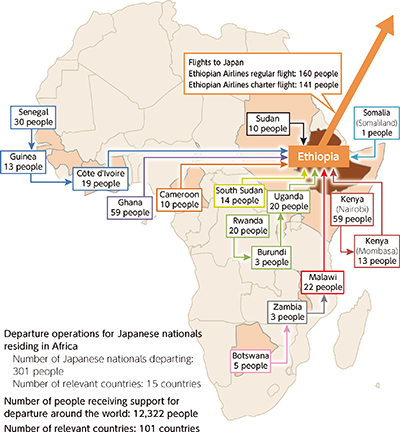
A Miracle on Children's Day:
Japan and the ROK Pass a Baton of Life Together
On May 3, the Embassy of Japan in India received an urgent call. India at the time had suspended regular international flights as part of its stringent border control measures against COVID-19. At such a time, a five-year-old girl from the ROK who was staying in India developed acute leukemia and needed to return to the ROK as quickly as possible for emergency treatment. Her medical condition could suddenly worsen at any time. The ROK Embassy in India, which was scrambling to help the girl's repatriation, requested cooperation of the diplomatic corps, pinning their last hope that they could save her life.
It was the Embassy of Japan in India that immediately responded to this request and offered to help the girl return to the ROK. The embassy staff extended as much support as possible to help the girl and her family, including arranging visas that were necessary for transferring to Narita international airport where the flight to the ROK departs. In order for the girl and her family to board the extra flight to Haneda airport, originally arranged for Japanese nationals to return to Japan, Japanese citizens who were scheduled to board the flight readily agreed to give their seats to the girl and her family. The ROK Embassy in Tokyo supported the transportation from Haneda to Narita.
Through the close cooperation between Japan and the ROK, the girl was able to return to the ROK via Japan on May 5 and receive treatment safely. This story received large media coverage as the “Miracle on Children's Day” in both Japan and the ROK, and a letter of gratitude was later sent to Foreign Minister Motegi from Foreign Minister of the ROK Kang Kyung-wha.
Many people from the two countries came together to save the life of the young girl. As people around the world have coped with an uncertain future amid the COVID-19 pandemic, this event has become a ray of hope.
The Wuhan Lockdown
Aoyama Takeo
Managing Director, Member of the Board, Nippon Steel Pipe Co., Ltd.
(Then Vice President, WISCO-NIPPON STEEL Tinplate Co., Ltd.)
The lockdown of Wuhan City was suddenly announced on the morning of January 23. The people of Wuhan, who were mostly unsuspecting of the new pneumonia (as COVID-19 was called then), suddenly started wearing masks from a few days earlier, and it seemed that the quarantine instructions of the Government of China were beginning to be enforced more rigorously. I had not expected, however, that a metropolis with a population of over 10 million would suddenly be in a complete lockdown. Train stations and airports were closed. Subway and bus services were suspended. Travel outside the city by ordinary vehicles was prohibited, and special permits were required for travel within the city. Wuhan literally became an isolated island on land. I had planned to go to Japan for the Chinese New Year holiday several days later, but this was no longer possible.
Initially, the situation was completely unforeseeable, and various information was circulating in the Japanese community. As Wuhan has no Japanese consulate-general, members of JETRO (Japan External Trade Organization) and the Japan Chamber of Commerce and Industry (including volunteers who had already gone to Japan for the Chinese New Year holiday) first took the lead in locating Japanese nationals who were in Wuhan. The group chat function of the Chinese social media app, WeChat, was tremendously helpful in this process. Various WeChat groups were integrated one after another, eventually forming a group consisting of several hundreds of people. It played a large role in compiling lists of Japanese nationals who were still in Wuhan and in sharing information from the Government of Japan. In the early morning of January 27, Mr. Ueno Atsushi, Minister of the Embassy of Japan in China, and other members of the Japanese Embassy arrived in Wuhan from Beijing by ground travel and started arranging flights chartered by the Government of Japan. I am sure that the aforementioned lists and the social media network were useful to them.
I myself flew to Japan on the first chartered flight. While I had never given much thought to China and Japan as nations, this experience gave me a vivid understanding of their existence as states. Seeing the members of MOFA and the embassy working hard on the front line to coordinate with Chinese authorities was also very encouraging. I will also never forget the many Chinese people who were concerned and helped us, including a Chinese businessman who extended a great deal of assistance when it was difficult to arrange buses to take us to the airport for our return.
After coming back to Japan, I changed to my current company without returning to Wuhan, and I still have not yet been able to revisit the city. I am looking forward to the day when the COVID-19 epidemic is over and I can reunite with my lao peng you (old friends).
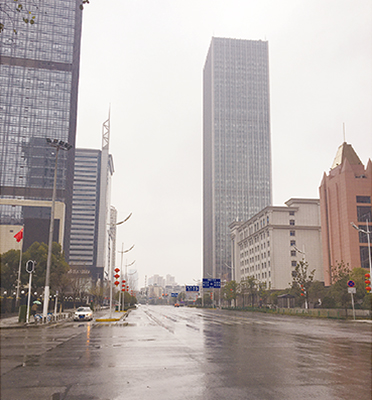 The main street in central Wuhan completely devoid of cars
The main street in central Wuhan completely devoid of cars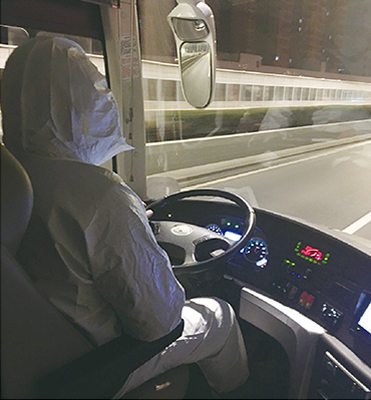 Driver of a bus headed to the airport
Driver of a bus headed to the airport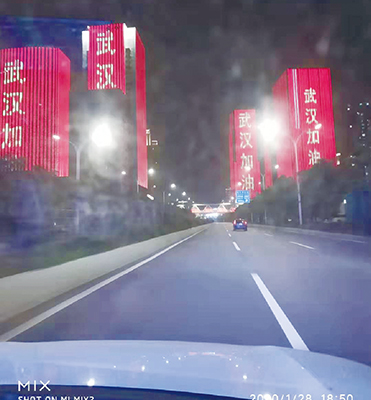 “武汉加油” (Stay strong, Wuhan) signages seen through the window of a bus headed to the airport
“武汉加油” (Stay strong, Wuhan) signages seen through the window of a bus headed to the airport2. Resumption of Cross-border Travel for Resuming Economic Activities
Many countries began to relax various types of restrictions on movement in the second half of the year of 2020 responding to the economic impact of COVID-19, whereas there are some countries that still faced the continuous spread and had concerns for the rebound of infections. Since the end of 2020, however, global awareness heightened regarding the danger of COVID-19 variants that are more contagious than the original strain, leading a number of countries, including Japan, to strengthen border control measures and take other measures. How to resume cross-border travel while carefully monitoring the infection situation is a key issue going forward.
From July 2020 onwards, Japan started the Residence Track, a measure that enables long-term residents and others to travel between Japan and 11 countries and regions where infections are under control, including Viet Nam, the ROK, and China. From September onwards, Japan also started the Business Track mainly for short-term business travelers for travel between Japan and Singapore, the ROK, Viet Nam, and China.
From October 1, Japan decided that holders of “Student,” “Dependent,” and other statuses of residence, in addition to cross-border business travelers would be incrementally permitted to enter Japan from all countries and regions in principle. Furthermore, after October 30, the level of the Travel Advice and Warning on Infectious Diseases was lowered from Level 3 to Level 2 for some countries and regions, such as the ROK, Singapore and Australia, and their designation as “country/region of departure subject to denial of permission to entry” was lifted.
However, in response to the spread of variants in various countries since December, the Government of Japan quickly strengthened border control measures for entry into Japan from countries and regions where variants have been confirmed. From January 9, 2021, the Government required that, in principle, all persons entering Japan must submit a certificate of negative result of a COVID-19 test conducted within 72 hours prior to departure and decided to conduct testing upon their entry. Additionally, since January 14, the Government has suspended the entry of foreign nationals from all countries and regions, including the countries and regions of the Residence Track and Business Track.
3. Initiatives for Strengthening the Global Response to COVID-19
Japan leads international collaboration to develop and procure vaccines and therapeutics
Ensuring the development, production, and equitable access to vaccines, therapeutics, and diagnostics is critical to contain the global spread of COVID-19. Competition among states to secure vaccines has become particularly intense due to their high demand immediately following the start of distribution. The international community needs to work together so that a few countries backed by considerable economic power do not monopolize the vaccines that are subject to some supply constraints. Through participation in international frameworks and contribution of financing, Japan is leading the global collaboration effort toward equitable access to vaccines for all nations regardless of their economic power.
In May, the Access to COVID-19 Tools (ACT) Accelerator was launched by the initiative of partners, including Japan and seven other countries, to serve as an international framework to accelerate the development, production, and equitable access to safe, effective, and affordable vaccines, therapeutics, and diagnostics. Under the ACT-Accelerator, international organizations and partners in the field of global health are sharing roles to address the four pillars of vaccines, therapeutics, diagnostics, and health system. Japan has been actively involved in the ACT-Accelerator as a founding donor of the initiative since its inception. As part of the ACT-Accelerator effort, the COVAX Facility was launched under the leadership of organizations such as Gavi, the Vaccine Alliance, which is a public-private partnership that supports immunizations in developing countries. The COVAX Facility is a comprehensive financing and supply coordination mechanism for COVID-19 vaccines. Its aim is to provide vaccines quickly and at affordable prices by negotiating with vaccine manufacturers to guarantee, for example, the purchase of a set number of vaccines. Japan is providing support to ensure equitable access to vaccines for all countries in the world, including developing countries, through contribution to the COVAX Facility's framework for developing countries known as the Advance Market Commitment (AMC), to which Japan announced it will contribute 200 million US dollars, and other initiatives.
As the COVAX Facility framework does not completely cover the creation of a cold chain system in developing countries, Japan is also complementing the efforts of the multilateral framework by providing “Last One Mile Support” at an unprecedented speed to deliver vaccines to each and every person in all corners of developing countries.
In addition to rolling out vaccines, Japan announced it will contribute 840 million US dollars to the Global Fund to Fight AIDS, Tuberculosis and Malaria over the three-year period from 2020 to 2022 and is supporting the expansion of diagnostics and therapeutics.
Outline of the ACT Accelerator
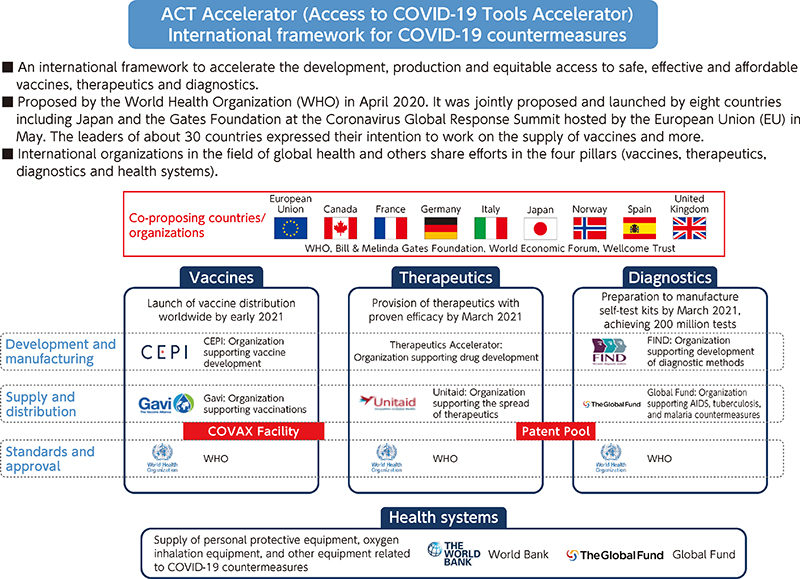
 Personal protective equipment (PPE) is essential for preventing the infection of healthcare workers (Photo: Global Fund, ©RED/Jonx Pillemer)
Personal protective equipment (PPE) is essential for preventing the infection of healthcare workers (Photo: Global Fund, ©RED/Jonx Pillemer)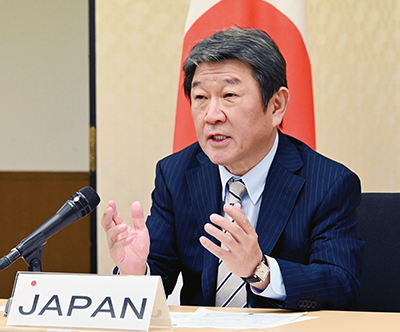
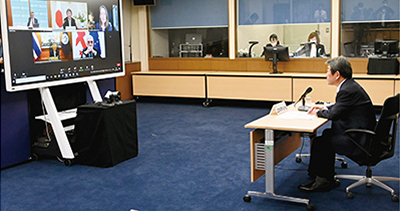 Foreign Minister Motegi announcing Japan's contribution to the AMC at the Ministerial Meeting of the Group of Friends of Universal Health Coverage (UHC) co-hosted by Japan (October 8)
Foreign Minister Motegi announcing Japan's contribution to the AMC at the Ministerial Meeting of the Group of Friends of Universal Health Coverage (UHC) co-hosted by Japan (October 8)Advance Market Commitment (AMC), a framework for developing countries under the COVAX Facility

Review of WHO's response
WHO is the core organization in the field of global health and is key to reinforcing the global health architecture to strengthen the response to public health emergencies.
In the response to COVID-19, WHO is playing a leading role in tracking and monitoring the spread of infection, providing essential supplies and information to frontline healthcare workers, and in the international framework for accelerating the development, production, and equitable access to vaccines, therapeutics, and diagnostics. Japan intends to support WHO in this role in order to strengthen global response capabilities to international health issues, and is contributing through its 76.4 million US dollar contribution to WHO's Strategic Preparedness and Response Programme (SPRP) and other efforts.
On the other hand, there is international opinion that there were delays in WHO's initial response to COVID-19. Against this backdrop, it is necessary to conduct an impartial, independent, and comprehensive review of the COVID-19 response of the international community, including WHO, in order to overcome the ongoing pandemic crisis and better prepare for future health crises. To this end, in addition to the existing Independent Oversight and Advisory Committee (IOAC), the Independent Panel for Pandemic Preparedness and Response (IPPPR) and the International Health Regulations (IHR) Review Committee, which were established based on a resolution of the World Health Assembly in May, are conducting reviews. In January 2021, IPPR released an interim report, which presented its tentative view that China's initial response lacked basic public health measures at the earliest stages, that China could have applied public health measures more forcefully as of January 2020, that WHO was not given sufficient financial resources or authority to function effectively, that WHO did not convene an Emergency Committee quickly and it was unclear why WHO did not declare an emergency until January 30, and that many countries did not take the necessary measures even after WHO issued an emergency declaration. In addition, from January to February 2021, the WHO-convened global study of the origins of COVID-19 conducted a study on the origins of COVID-19 in China. Through these studies, it is important to elucidate the origins of COVID-19 outbreaks and strengthen capabilities to deal with future health crises.
Japanese experts are participating in the IHR Review Committee. Furthermore, Japan has provided materials to IPPR and WHO member countries on Japan's response to COVID-19 and Japan's view on the review and reform of WHO and other organizations, and is actively engaged in related discussions. Japan will continue to contribute to the review and reform of WHO and other international health frameworks.
In July 2020, the Trump administration of the U.S. notified the UN that it would withdraw from WHO in a year. However, in January 2021, the new Biden administration withdrew this notice. Japan will continue to work with the U.S. and the rest of the international community in addressing health issues.
4. Support to Developing Countries
Support for controlling infection and strengthening health and medical systems
in developing countries
The COVID-19 pandemic is threatening people's lives, livelihoods, and dignity and has become a human security crisis. With people and goods moving globally, the entire international community needs to work together to address the crisis based on the concept of “leaving no one behind.” In addition, it is important to control the spread of COVID-19 in developing countries with weak health and medical systems, not only because of its direct implications on the health and safety of Japanese nationals in those countries but also for preventing the virus from entering Japan.
From this perspective, Japan has been providing support to developing countries through bilateral cooperation, such as grant aid and technical cooperation, as well as cooperation through international organizations to strengthen COVID-19 response capabilities, including prevention, diagnostics, and therapeutics, to build resilient and inclusive health systems, and to generate an environment that is resilient to infectious diseases.
Under the bilateral cooperation scheme, Japan is not only responding to the urgent issue of COVID-19 but is also providing grant aid (approximately 48 billion Japanese yen) for the provision of health and medical equipment, such as X-ray cameras, thermal imaging cameras, and ambulances, in order to strengthen the mid- to long-term health and medical systems of developing countries. As of the end of December, Japan concluded exchanges of notes with 93 countries. Accordingly, Japan has provided assistance at an unprecedented speed, taking advantage of its advanced technological capabilities and knowledge, and the assistance has been highly evaluated by countries for their timeliness.
In particular, for the ASEAN region, Japan announced its support for the establishment of the ASEAN Centre for Public Health Emergencies and Emerging Diseases to enhance the region's capabilities to combat infectious diseases and contributed approximately 5.5 billion Japanese yen to the Japan-ASEAN Integration Fund.
The Japan International Cooperation Agency (JICA) has been providing capacity building support to organizations around world for many years and they are working at the forefront of the fight against COVID-19. In response to the spread of COVID-19, JICA has provided technical cooperation to 45 countries by December, including support for the development of medical systems (1.5 billion Japanese yen from the FY2020 first supplementary budget), by leveraging its relations with these organizations. Among them, the Noguchi Memorial Institute for Medical Research (NMIMR) in Ghana, which was established about 40 years ago with Japan's cooperation, plays a central role in tackling COVID-19 in West Africa, conducting up to 80% of PCR tests in Ghana and providing guidance to neighboring countries. JICA has cooperated with NMIMR in speeding up and improving the efficiency of PCR tests by providing equipment and other support. In Viet Nam, JICA provided equipment, such as test kits, artificial lungs, and ventilators, as well as technical cooperation for controlling hospital-acquired infections to the National Institute of Hygiene and Epidemiology, which plays a central role in COVID-19 testing, and to core hospitals, including Cho Ray Hospital, which accepts COVID-19 patients. Through such support, Japan made a comprehensive contribution to the responses in Viet Nam. JICA plans to expand its cooperation with other domestic partners and international organizations to further broaden its cooperation.
Furthermore, in April, based on requests from a number of countries, Japan decided to provide an emergency grant aid totaling 1 million US dollars for expanding international clinical research on Avigan®, a drug that has been attracting great interest from many countries for preventing viral replication. From a humanitarian standpoint, the grant has been provided incrementally through the United Nations Office for Project Services (UNOPS) to interested countries. As of the end of December, the drug was provided to 45 countries, and recipient countries have expressed appreciation.
Japan also provides support in cooperation with international organizations, such as the United Nations Development Programme (UNDP), the United Nations Children's Fund (UNICEF), and UN Women. Through these organizations, Japan provides emergency support, including technical assistance and assistance in kind, to health and medical workers in developing countries to control and prevent the spread of COVID-19 as well as support to mitigate its social and economic impact.
For example, through UNDP, Japan distributed hand soap and other health and hygiene supplies to Umbada Hospital in the suburbs of Khartoum, the capital of Sudan, and its surrounding areas. This hospital was built with Japan's grant aid and handed over to the Sudanese side in November 2018. In extending this support for the COVID-19 response, UNDP partnered with JICA to provide supplies to the hospital and conduct hygiene awareness-raising activities for the community.
By the end of December, Japan provided assistance to 29 countries through UNDP, 66 countries through UNICEF, and 13 countries through UN Women.
Moreover, MOFA, in partnership with the United Nations Volunteers (UNV) programme, launched a program to assign Japanese nationals as UN volunteers to help reduce the impact of COVID-19 in developing countries. In this program, more than 10 Japanese citizens were selected through the UNV selection process to engage in activities in various fields, such as health, sanitation, and socio-economic recovery. The activities are part of COVID-19 countermeasures undertaken by the country offices of international organizations in Africa (Ethiopia, Kenya, Madagascar, Malawi, Namibia and Zimbabwe) and Asia (Myanmar, Nepal, Timor-Leste and Uzbekistan). Since August 2020, each of these Japanese Volunteers has been deployed for a term of up to eight months as soon as coordination with the host entities and travel arrangements were completed.
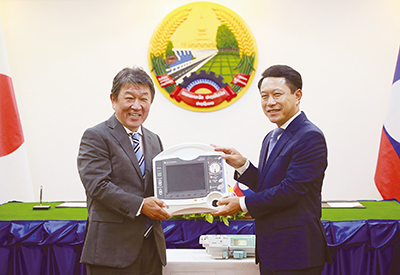 Handover ceremony for provision of medical equipment to Laos (August 23, Laos)
Handover ceremony for provision of medical equipment to Laos (August 23, Laos)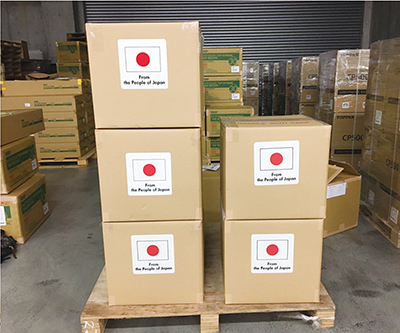 Provision of syringe pumps
Provision of syringe pumps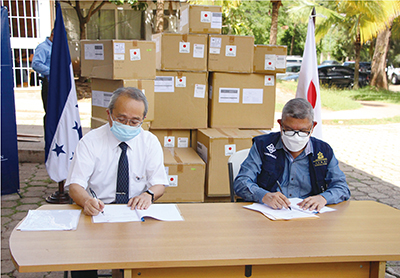 Handover ceremony for provision of medical equipment to Honduras (September 10, Honduras)
Handover ceremony for provision of medical equipment to Honduras (September 10, Honduras)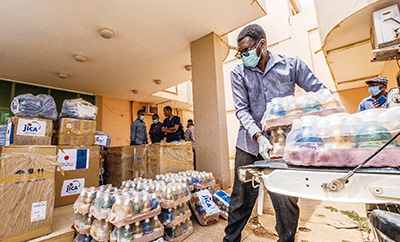 Provision of hygiene supplies to Sudan through UNDP
Provision of hygiene supplies to Sudan through UNDP(Photo: UNDP)
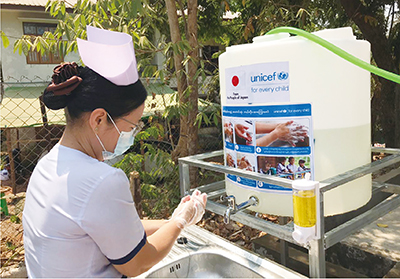 Handwashing support provided to Myanmar through UNICEF (Photo: UNICEF)
Handwashing support provided to Myanmar through UNICEF (Photo: UNICEF)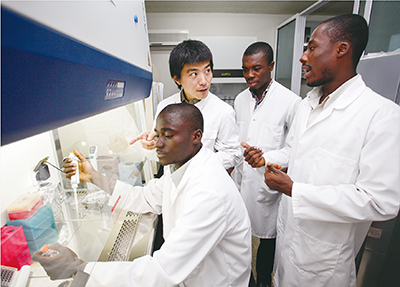 Human resource development support at the Noguchi Memorial Institute for Medical Research in Ghana (Photo: JICA/Iizuka Akio)
Human resource development support at the Noguchi Memorial Institute for Medical Research in Ghana (Photo: JICA/Iizuka Akio)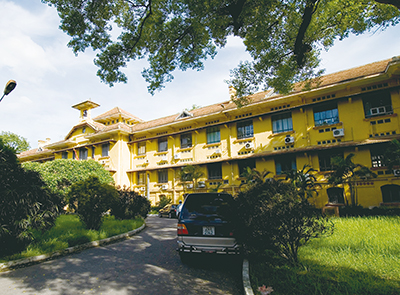 The National Institute of Hygiene and Epidemiology in Viet Nam that was provided with medical equipment (Photo: JICA/Yoshida Katsumi)
The National Institute of Hygiene and Epidemiology in Viet Nam that was provided with medical equipment (Photo: JICA/Yoshida Katsumi)Japanese Taking Active Roles as United Nations Volunteers
Honda Yuri
United Nations Volunteer (UNV)
Project Support Officer, International Organization for Migration (IOM) Nepal Country Office
The spread of COVID-19 has had a major impact on the movement of people around the world. Migrants are among those who find themselves in dire situations, facing income reduction, unemployment, and lack of access to adequate health care in their countries of stay. The International Organization for Migration (IOM) provides support to migrants who are placed in a more vulnerable situation due to COVID-19. As part of the response to the pandemic, the IOM Nepal Country Office where I work is conducting a population mobility mapping exercise and assessment. In the exercise, we carried out interviews in provinces along the border with India, namely at border points of entry as well as hospitals, schools, markets, compounds of the traditional healer, and other places where there are particularly large movements of people. We collected information such as the conditions of screening facilities, the implementation of body temperature checks, and responses taken when an infected person is found. The assessment revealed that health facilities needed to be improved and that staff needed to be trained in infection prevention and control. IOM will be working with local governments to address these issues. I am mainly in charge of reporting, and I see it as my responsibility to organize the valuable data that my colleagues collected despite travel restrictions and infection risks, and present it to the government in a convincing manner.
A lot of people in Nepal earn income as overseas migrant workers. Due to COVID-19, many of them have lost their jobs and have had to return to Nepal. Nepalis in my neighborhood often tell me that they have family working in Japan. Many express concerns about the health of their family members who cannot return to Nepal, and I realized firsthand the situation faced by foreign workers in the pandemic. In Nepal, there are reports that returnees are being discriminated against or persecuted in their communities due to misunderstanding, making it an urgent task to prevent the spread of infection and strengthen health monitoring capacity. I intend to do my best to ensure that I can contribute to the UN's approach to “leaving no one behind” as a member of the organization.
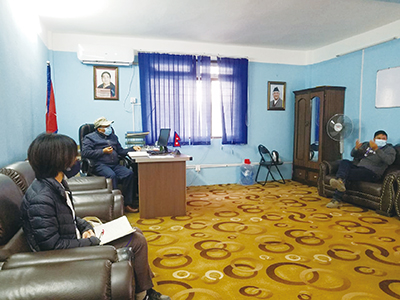 Exchanging views and opinions with members of the local government (municipality) that is responsible for health surveillance at border points of entry, and the Ministry of Health and Population (author on front left side) (Photo: IOM)
Exchanging views and opinions with members of the local government (municipality) that is responsible for health surveillance at border points of entry, and the Ministry of Health and Population (author on front left side) (Photo: IOM)Support for maintaining, revitalizing, and increasing the resilience of economic activities in developing countries
The global spread of COVID-19 and the resulting stagnation of socio-economic activities pose a major threat to the economies and societies of all countries in today's world characterized by the global flow of people and goods. In particular, COVID-19 has significant economic and social impact on developing countries with weak economic foundations, and the international community as a whole needs to unite to help maintain, revitalize, and increase the resilience of economic activities in developing countries. Japan is supporting the revival of economic activities in developing countries through provision of bilateral loans and implementation of international initiatives to defer debt payments.
Japan established the COVID-19 Crisis Response Emergency Support Loan of up to 500 billion Japanese yen over a two-year period from April 2020 to March 2022. The aim is to promptly provide financing required for economic measures and other initiatives to developing countries, mainly in Asia and Oceania, which have close ties to the Japanese economy, including the Philippines, Indonesia and India (50 billion Japanese yen each). This yen loan will be provided under favorable conditions for developing countries, such as low interest rate (0.01%) and untied*2 procurement conditions, thereby contributing to the maintenance and revitalization of economic activities in developing countries in Asia and Oceania and other regions affected by the pandemic.
- *2 Untied refers to aid in which the supplier of goods and services is determined through international competitive bidding. On the other hand, tied refers to aid in which the supplier is limited to donors or other conditions are attached.
Furthermore, the Emergency Support Loan was expanded in December 2020 based on the “Comprehensive Economic Measures to Secure People's Lives and Livelihoods toward Relief and Hope” (Cabinet decision of December 8). Japan will promptly provide financing needed for strengthening health systems and maintaining and revitalizing economies to developing countries, mainly in Asia and Oceania that have many geographical and economic linkages with Japan.
Especially in developing countries with the most vulnerable fiscal conditions, foreign direct investment is expected to decline by up to 45%, causing a deterioration in the macroeconomic environment and increasing the debt repayment burden in many countries. In light of these circumstances, the G20 Finance Ministers and Central Bank Governors, and the Paris Club, a group of major creditor countries, agreed to the Debt Service Suspension Initiative (DSSI) in April 2020. Public debt service dues falling between May 1 and December 31, 2020 in low-income countries was deferred. In October of the same year, the G20 Finance Ministers and Central Bank Governors and the Paris Club agreed to further an extension of the DSSI, which covers public debt service dues falling between January 1, 2021 and the end of June 2021. Japan will continue to implement this initiative fully and in a transparent manner.
In addition, in November 2020, the G20 Finance Ministers and Central Bank Governors and the Paris Club endorsed the “Common Framework for Debt Treatments beyond the DSSI,” recognizing that debt treatments beyond the DSSI may be required, as appropriate, depending on each country's circumstances, given the scale of the COVID-19 crisis, the significant debt vulnerabilities, and deteriorating economic outlook in many low-income countries. The Common Framework sets out that all official bilateral creditors will participate in debt treatments and implement them under common terms, and that private creditors' treatment will be at least as favorable as that provided by official creditors. Going forward, it is necessary to ensure that all creditors fully implement debt treatments in line with the “Common Framework.”
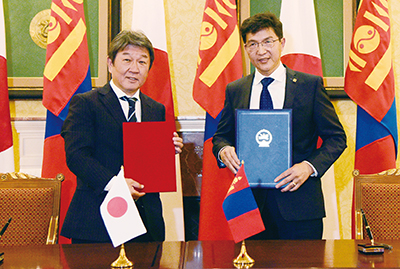 Signing ceremony for the Emergency Support Loan for Mongolia (October 9, Mongolia)
Signing ceremony for the Emergency Support Loan for Mongolia (October 9, Mongolia)5. Communications on Japan's Situation and Initiatives
As part of the response to COVID-19, it is important to communicate Japan's situation and efforts, including trends in the number of infected people, measures to prevent the spread of infection, and international cooperation, and thereby gain the accurate understanding of the international community. From this perspective, MOFA is working to carry out communication in a timely and appropriate manner.
At the headquarters, the foreign minister explains about Japan's assistance and the importance of international vaccine cooperation at meetings with his counterparts. Since April, MOFA has been live streaming regular press conferences by the foreign minister in Japanese and English to convey the current state of border control measures and other topics in real time. Furthermore, MOFA coordinated with relevant ministries and agencies in holding press conferences for the foreign press in Tokyo a total of 18 times by the end of December. MOFA is also producing and streaming public relations contents to introduce Japan's initiatives and technologies, as well as examples of international cooperation related to COVID-19.
Diplomatic missions are also carrying out various communications. In addition, with the cooperation of relevant ministries and agencies as well as Japanese experts, they have conducted online seminars in collaboration with overseas think tanks and universities such as the Royal Institute of International Affairs (UK) and Johns Hopkins University (U.S.), coupled with producing program contents and publishing articles in cooperation with overseas media such as the BBC (UK) and the Wall Street Journal (U.S.). Through these initiatives, Japan shares its knowledge and information on its efforts with other countries, including findings on droplet infection from research using the latest science and technology.
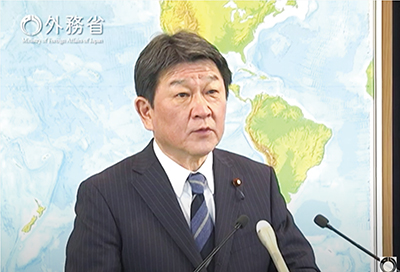 Live streaming of a regular press conference by Foreign Minister Motegi
Live streaming of a regular press conference by Foreign Minister Motegi6. For the Success of the Olympic and Paralympic Games Tokyo 2020
On November 16, 2020, during a courtesy call by IOC President Bach who was visiting Japan, Prime Minister Suga expressed his determination to host the Olympic and Paralympic Games Tokyo 2020 as a symbol of overcoming COVID-19, and furthermore, as “Reconstruction Olympic and Paralympic Games” to show the world how Japan has been recovering from the Great East Japan Earthquake. In response, President Bach stated that the Games will make a worldwide contribution and that he was determined to ensure the Games are realized and are successful. Both leaders concurred to work closely toward safe and secure Games.
On March 16, 2021, at the Japan-U.S. Foreign Ministers' Meeting with U.S. Secretary of State Antony Blinken, Foreign Minister Motegi expressed Japan's determination to host the Games and obtained the support of Secretary Blinken. The Ministers also concurred to continue to work closely toward successful Games.
MOFA intends to contribute to the government-wide efforts and strive to ensure successful Games.
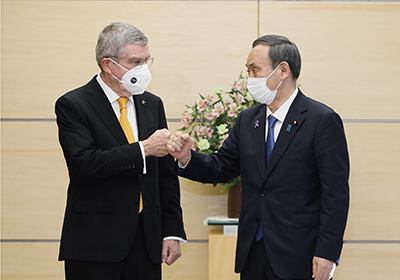 Prime Minister Suga receiving a courtesy call from IOC President Bach (November 16, Tokyo; Photo: Cabinet Public Relations Office)
Prime Minister Suga receiving a courtesy call from IOC President Bach (November 16, Tokyo; Photo: Cabinet Public Relations Office)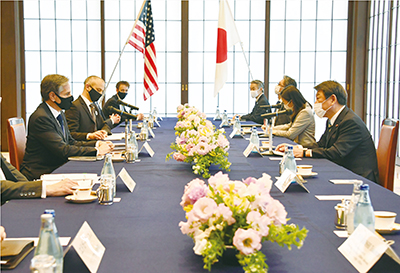 Japan-U.S. Foreign Ministers' Meeting
Japan-U.S. Foreign Ministers' Meeting (March 16, 2021, Tokyo)
